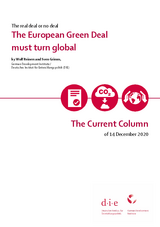The Current Column
The real deal or no deal
The European Green Deal must turn global
Reiners, Wulf / Sven GrimmThe Current Column (2020)
German Development Institute / Deutsches Institut für Entwicklungspolitik (DIE), The Current Column of 14 December 2020
Last Friday, on 11 December 2020, the European Council agreed on tougher climate goals. The heads of state or government endorsed a binding EU target to cut greenhouse gas emissions of at least 55 percent by 2030. The decision is connected to Europe’s ambition to fundamentally change its economic model towards sustainability. The plan was presented by Commission President Ursula von der Leyen exactly one year earlier, on 11 December 2019, as the European Green Deal. It is the EU’s response to the climate and environmental emergency. The Deal’s core objective is to make Europe the first climate-neutral continent by 2050. With the Corona pandemic of 2020, the Green Deal also became the EU’s strategy for economic recovery.
On the international stage, however, this strategy has received mixed reactions. On one hand, the EU can build on the ambitions of key partners. Japan and South Korea have announced their intention to become carbon-neutral economies by 2050. US President Elect Joe Biden campaigned on the same promise, and China has formulated a similar target for the year 2060. On the other hand, Russia has threatened to sue the EU at the WTO over a planned border carbon adjustment mechanism, that could charge emission taxes on imports to the EU. Brazil and Indonesia have described the EU’s attempts to project its climate objectives through trade as a new form of ‘colonialism’.
Combined with strong structural economic capacities, countries like Brazil, China, India, Indonesia, Mexico and South Africa have gained international weight. Their engagement in global governance through South-South-Cooperation, the BRICS or the G20 provides them with international leverage. They have a lot of influence on the political acceptance of transformation towards sustainability at large. All of these countries have high potential with regard to renewable energy, and they hold many global ecological treasures. At the same time, they face high levels of environmental degradation, pollution and carbon emissions.
Cooperation can turn the Green Deal global
Strong cooperation with these actors on the Green Deal is imperative. The EU maintains strategic partnerships with China, India, Brazil, Mexico, and South Africa, and holds a key position as a trading power. Its standards and policies have implications for exporting partners, and can set an example globally. As part of the Green Deal, the EU actively tries to include sustainability and ecological transition in trade agreements. Ongoing discussions on deeper cooperation, such as the EU-India ‘Roadmap to 2025’ or the EU-MERCOSUR free trade and association agreement, provide immediate opportunities to address resource efficiency and circular economy (India) or digital economy, environmental protection and ocean policy (MERCOSUR). The EU could strengthen its “Green Deal Diplomacy” by taking a firmer approach to less ambitious non-EU emitters by linking economic measures to climate action.
Know thy partners - and work on the narrative
Better knowledge about the perspectives of these partners is required to build a joint understanding as the basis for cooperation, along with a wider set of instruments to respond to specific needs. The Managing Global Governance (MGG) network hosted by DIE, together with the Finnish Institute of International Affairs and the Konrad-Adenauer-Foundation has initiated a series of research, publication and policy dialogue formats around the EU’s Green Deal. With partners from (re)emerging economies, the new initiative systematically explores opportunities and obstacles related to its external dimension.
First analyses show how, for instance, China’s steel industry is likely to be affected by the border carbon adjustment mechanism. At the same time, an EU-China Green Deal could factor in China’s offsetting ambitions, and cooperate on digital technologies and green finance. Cooperation with Indonesia could build on existing EU contributions to Indonesia’s climate action plans and best practices in energy transition. Any sort of EU-Russia Green Deal will have to recognise the massive implications of the European Green Deal’s energy objectives for Russia’s oil and gas exports. Russia understands the European Green Deal as geopolitical, rather than environmental. Effective emission reductions may, nevertheless, still be possible, for instance via joint projects on energy efficiency.
However, it will not be enough for the EU to understand country-specific entry points for cooperation; it will also have to craft a Green Deal narrative that is sensitive to the partner’s concerns. For instance, the Green Deal’s link to job creation might be indispensable in South Africa, and the EU’s historic responsibility for global warming might be particularly important in India. On this basis, the European Green Deal can turn into a real deal: a Global Green Deal.



